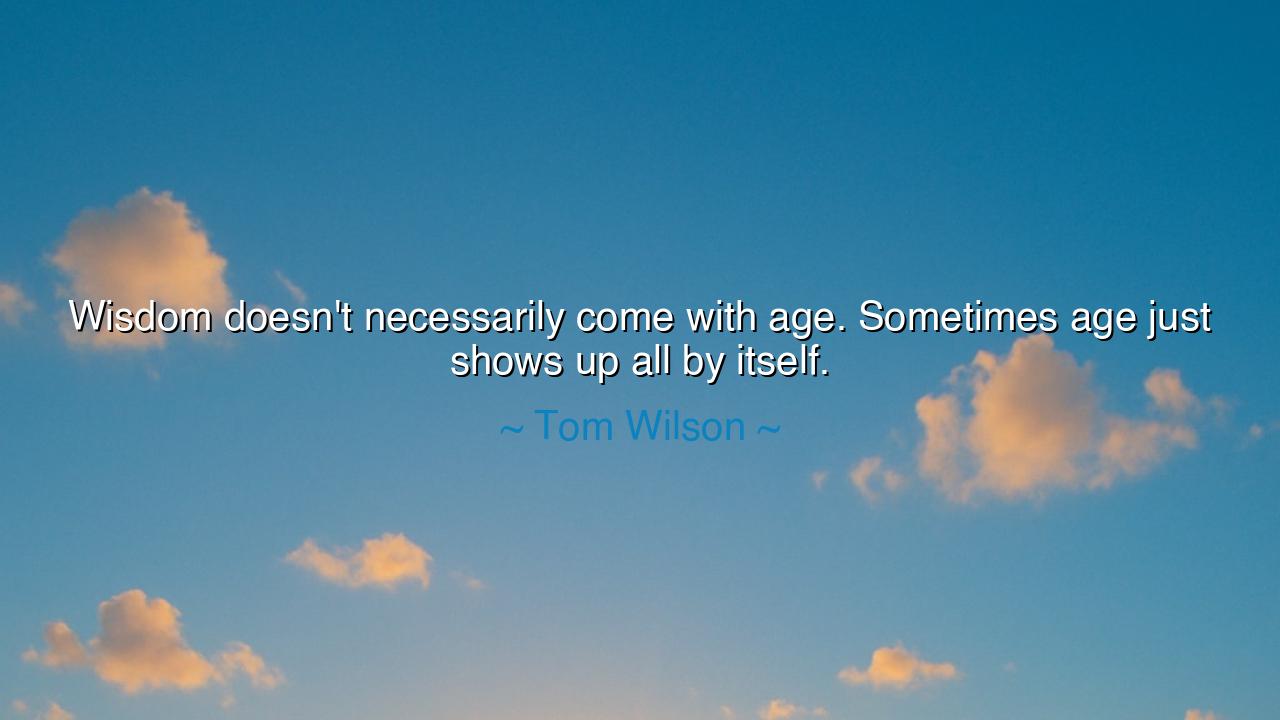
Wisdom doesn't necessarily come with age. Sometimes age just






"Wisdom doesn't necessarily come with age. Sometimes age just shows up all by itself." These words from Tom Wilson remind us of the difference between the passage of time and the growth of wisdom. It is a sobering reflection that age, while inevitable, does not automatically confer the depth, understanding, or insight that we often expect. Wisdom is not simply a matter of accumulating years; it requires reflection, learning, and a mindful approach to life. Age, in itself, is no guarantee that one has lived well or learned deeply. It is a choice to seek understanding, to reflect on experience, and to grow from both success and failure. The years may accumulate, but without the work of reflection, they are little more than the passing of time.
The ancients often spoke of wisdom as a virtue that had to be cultivated with intention. Socrates famously stated that "the unexamined life is not worth living," emphasizing that wisdom is not something that comes automatically as one grows older, but something that must be actively sought. Socrates, though older, was always questioning, always seeking to learn, always reflecting. His wisdom was not merely the result of his years but the product of his constant inquiry into the nature of truth, virtue, and the human condition. The Stoics, like Seneca and Marcus Aurelius, also believed that wisdom came through self-discipline, reflection, and the pursuit of virtue, rather than the passage of time. They understood that age could bring experience, but wisdom required a deeper engagement with life.
Consider the example of King Solomon, renowned for his wisdom in ancient Israel. Solomon did not acquire wisdom by simply growing older; rather, he sought it actively when he prayed for the ability to judge rightly, asking God for an understanding heart. His wisdom came from his humble desire to understand and his willingness to listen to others. Solomon’s story teaches us that wisdom is not an automatic byproduct of age, but rather a result of a mind that is open, curious, and willing to grow. While Solomon’s age and experience certainly played a role in his wisdom, it was his dedication to learning and his ability to reflect deeply that made him one of the most celebrated wise rulers in history.
The life of Leonardo da Vinci further illustrates this point. Though his age spanned the late Renaissance, a time of great intellectual development, it was da Vinci’s curiosity and persistence that made him a symbol of wisdom. In his later years, he continued to explore a variety of fields—art, anatomy, engineering, and more—constantly challenging his own understanding. His mind never ceased to question, to explore, to learn. Despite the years he lived, da Vinci’s wisdom was not a simple consequence of his age, but a result of his constant pursuit of knowledge. His example shows that wisdom is not something passive—it is an active pursuit, a lifelong endeavor.
Wilson’s quote also invites us to reflect on the limitations of age. In our modern world, we often place great value on experience, equating years lived with wisdom gained. But experience alone is insufficient. Just as Seneca cautioned that age should not be a reason for complacency, so too must we understand that simply growing older does not make one wise. The years we live may provide opportunities to gain wisdom, but it is through reflection and learning that we shape those years into something meaningful. Wisdom is the fruit of a life well-lived, not just a collection of years that have passed.
The lesson in Wilson's words is one of intentionality. We must not fall into the trap of believing that simply living longer will bestow wisdom upon us. Instead, we must actively engage with the world, seek knowledge, reflect on our actions, and learn from our experiences. Age may come unbidden, but wisdom requires effort. Let us not wait for time to bestow wisdom upon us, but rather take it into our hands and make it our goal to grow wiser with each passing year. The practice of learning, of asking questions, of seeking deeper meaning in all aspects of life will ensure that the passing of years is not just the accumulation of time, but the development of clarity and insight.
In practical terms, we must actively pursue growth, no matter our age. Read, question, reflect, and seek out experiences that challenge us. Mentor others and allow their perspectives to enrich our own. Engage in conversations that stretch our understanding and embrace the uncomfortable process of self-examination. As we age, we should not let the years pass in mindless routine but instead use each year as an opportunity to grow in wisdom, to develop the insight that can only come through intentional learning. Let age be a foundation upon which we build deeper understanding, not a measure of our limitations.






AAdministratorAdministrator
Welcome, honored guests. Please leave a comment, we will respond soon